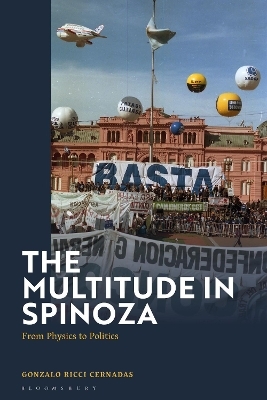
The Multitude in Spinoza
From Physics to Politics
Seiten
2024
Bloomsbury Academic (Verlag)
978-1-350-43769-2 (ISBN)
Bloomsbury Academic (Verlag)
978-1-350-43769-2 (ISBN)
- Noch nicht erschienen (ca. Dezember 2024)
- Versandkostenfrei
- Auch auf Rechnung
- Artikel merken
With the rise of populist governments and corresponding popular protests, this book turns renewed focus on Baruch Spinoza’s idea of the political multitude. Acting at once as a body with a single mind and a state with its own political-institutional structure, the multitude mirrors some of the central actors in democratic movements across early 20th-century Europe – from Occupy Wall Street to Indignados and Nuit Debout.
Gonzalo Cernadas draws from two of Spinoza’s key works on this subject in his Political Treatise and Theological-Political Treatise, setting out the progress of his ideas: how Spinoza conceives of the body, how that body can become part of the multitude, and how that multitude can form a political society. In recovering Spinoza’s relevance to contemporary political phenomena, Cernadas explains why this early modern thinker has found renewed importance three hundred and fifty years after his death, and ultimately how he could even prompt us to reassess democracy as the best form of government.
Gonzalo Cernadas draws from two of Spinoza’s key works on this subject in his Political Treatise and Theological-Political Treatise, setting out the progress of his ideas: how Spinoza conceives of the body, how that body can become part of the multitude, and how that multitude can form a political society. In recovering Spinoza’s relevance to contemporary political phenomena, Cernadas explains why this early modern thinker has found renewed importance three hundred and fifty years after his death, and ultimately how he could even prompt us to reassess democracy as the best form of government.
Gonzalo Ricci Cernadas is Professor of Philosophy and Modern Political Theory at the Faculty of Social Sciences at the Gino Germani Research Institute, Argentina.
Introduction
Part I: The Body
1. Physics in Descartes’ “Principles of Philosophy”
2. Physics in Ethics
Part II: The Multitude
3. From Physics to Affects
4. The Multitude in the Theological-Political Treatise
5. The Multitude in the Political Treatise
Part III: Excursus
6. The Conceptual Origin of the Multitude
7. The Conceptual Futures of the Multitude
Part IV: The State
8. Power as potentia and potestas
9. The Constitution of Democracy as imperium absolutum
10. The Place of Institutions
Conclusion: The Various Faces of the Multitude and the State
| Erscheint lt. Verlag | 26.12.2024 |
|---|---|
| Verlagsort | London |
| Sprache | englisch |
| Maße | 156 x 234 mm |
| Themenwelt | Geisteswissenschaften ► Philosophie |
| Sozialwissenschaften ► Politik / Verwaltung ► Politische Systeme | |
| Sozialwissenschaften ► Politik / Verwaltung ► Politische Theorie | |
| ISBN-10 | 1-350-43769-7 / 1350437697 |
| ISBN-13 | 978-1-350-43769-2 / 9781350437692 |
| Zustand | Neuware |
| Haben Sie eine Frage zum Produkt? |
Mehr entdecken
aus dem Bereich
aus dem Bereich
über Alltagsorte des sozialen Zusammenhalts
Buch | Softcover (2024)
transcript (Verlag)
CHF 33,55


